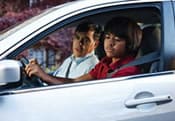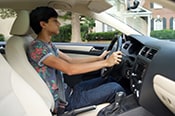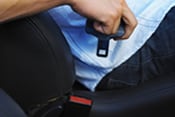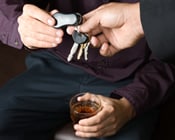Eight Danger Zones
Motor vehicle crashes are the leading cause of death for teens. The good news is that teen motor vehicle crash deaths and injuries can be prevented. Make sure your young driver is aware of the leading causes of teen crashes. Then use a Parent-Teen Driving Agreement to put rules in place that will help your teen stay safe.

Crash risk is highest in the first year a teen has his or her license. Crash risk is particularly high during the first several months of licensure.
What Parents Can Do
- Provide as many hours of supervised driving practice as possible over at least six months.
- Practice on a variety of roads, at different times of day, and in varied weather and traffic conditions.
- Stress the importance of continually scanning for potential hazards including other vehicles, bicyclists, and pedestrians.

Crash risk goes up when teens drive with other teens or young adults in the car.
What Parents Can Do
- The best practice is for your teen to have no teen or young adult passengers for at least the first six months after they get their license. If that’s not possible, limit your teen to just one teen or young adult passenger.
- Learn about passenger restrictions and other important requirements of your state’s Graduated Driver Licensing system on the Insurance Institute for Highway Safety’s graduated licensing laws by state webpage.

Fatal crashes are more likely to occur at night, but the risk is even higher for teens.
What Parents Can Do
- Make sure your teen is off the road by 9 or 10 pm for at least the first six months of licensed driving.
- Practice nighttime driving with your teen when you think your teen is ready.

The simplest way to prevent car crash deaths and injuries is to buckle up.
What Parents Can Do
- Require your teen to wear a seat belt on every trip—regardless of whether they’re the driver, the front seat passenger, or a back seat passenger. This simple step can reduce your teen’s risk of dying or being seriously injured in a crash by about half.
- Get the stats on teen seat belt use when riding in a car driven by someone else.

Distractions increase your teen’s risk of being in a crash.
What Parents Can Do
- Don’t allow activities that take your teen’s attention away from driving, such as talking on a cell phone, texting, eating, or playing with the radio.
- Learn more about distracted driving.
- Get the stats on teen texting/e-mailing while driving.

Research shows that teens lack the experience, judgment, and maturity to assess risky situations.
What Parents Can Do
- Make sure your teen knows to follow the speed limit and to adjust speed to match road, traffic, and weather conditions.
- Remind your teen to maintain enough space behind the vehicle ahead to avoid a crash in case of a sudden stop.

Even small amounts of alcohol will impair your teen’s driving ability and increase their risk of a crash. Many other types of drugs/substances (including marijuana, other illicit drugs, prescription medications, or over-the-counter medications) also can impair a teen’s ability to drive safely.
What Parents Can Do
- Be a good role model:
- Never drink and drive.
- Never drive while impaired by other drugs/substances.
- Reinforce this message with a Parent-Teen Driving Agreement.
- Learn more about impaired driving.
- Get the stats on teen drinking and driving.
